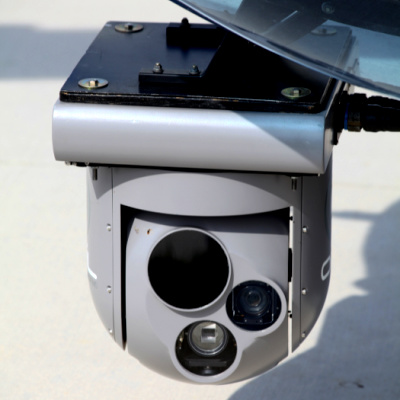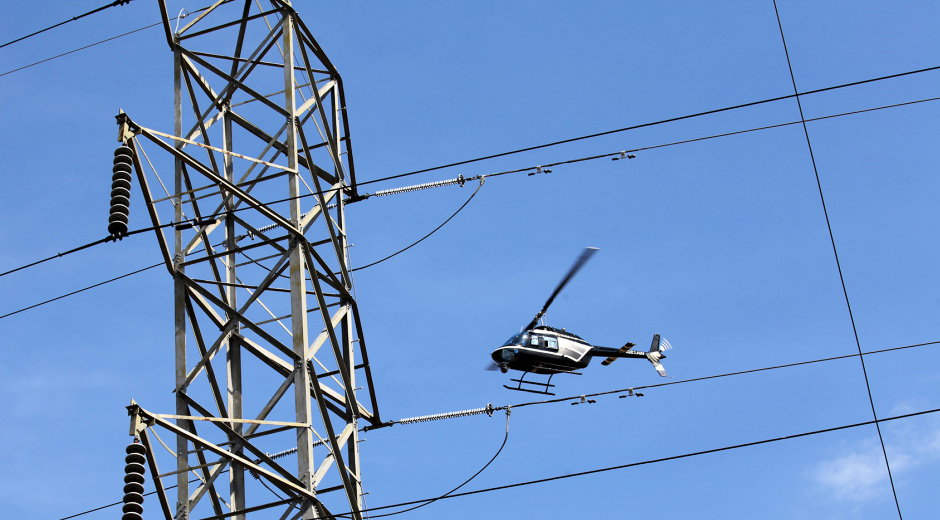Helicopters, Infrared Technology Used to Complete Proactive Inspections of High-Voltage Power Lines in Western Pennsylvania
Patrols identify invisible equipment issues to prevent future service interruptionsGREENSBURG, Pa., Oct. 14, 2021 -- To keep power flowing safely and reliably for Penn Power and West Penn Power customers through the upcoming winter months, proactive aerial inspections were recently completed along nearly 1,000 miles of 345-kilovolt (kV) transmission lines in the greater Pittsburgh area using infrared and ultraviolet (IR/UV) technology.
Completed every four years, IR/UV patrols help prevent future power outages by detecting early-stage and often invisible equipment issues within transmission substations and on high-voltage power lines that cannot be observed during regular visual inspections. These comprehensive inspections complement annual aerial patrols that identify visible concerns, like overgrown trees, broken pole hardware or nesting birds on electrical equipment.
"Maintaining our transmission system is the first line of defense in preventing power outages because it supplies the electricity that flows into substations and along power lines to every single one of our customers," said Scott Wyman, president of FirstEnergy's Pennsylvania operations. "Think of the power system like a sprinkler. The garden hose that supplies water is a transmission line and the sprinkler is the substation. Each stream of water coming out of the sprinkler hits different parts of the lawn, just like individual power lines feed electricity to various neighborhoods."

An IR/UV inspection is performed at low-flying patrol speeds between 25 and 35 mph, using an infrared and ultraviolet camera mounted on the bottom of the helicopter. The onboard thermographer uses the camera to view the electrical equipment through infrared and ultraviolet spectrums to identify any sources of overheated components or voltage issues.
The infrared technology shows heat on a color scale, with brighter colors or "hot spots" indicating areas that could need repairs. The thermal images can identify equipment issues such as loose connections, corrosion and load imbalances, while ultraviolet technology detects electrical discharge along a power line caused by issues like rusted hardware and cracked insulators. The combination of both technologies is beneficial because it provides a wider range of detection. Any issues identified during the inspections are addressed to prevent service disruptions and costly repairs down the road.
"Helicopters provide us with a view of our electrical equipment that we can't get from the ground, allowing us to inspect miles of power lines in a single day," said Wyman. "However, on-the-ground inspections are still necessary and underway to ensure our neighborhood power lines and equipment are ready to meet the high demand for electricity when customers crank up their heaters to stay comfortable this winter."
Visual aerial inspections have also been completed along nearly 2,000 miles of 138-kV and 69-kV lines in 2021, with approximately 500 more miles of high-voltage lines to be inspected by the end of the year.
Penn Power is a subsidiary of FirstEnergy Corp. (NYSE: FE) and serves approximately 169,000 customers in all or parts of Allegheny, Beaver, Butler, Crawford, Lawrence and Mercer counties in western Pennsylvania. Follow Penn Power on Twitter @Penn_Power, on Facebook at www.facebook.com/PennPower and online at www.pennpower.com.
West Penn Power, a FirstEnergy electric company, serves approximately 734,000 customers within 24 counties in central and southwestern Pennsylvania. Follow West Penn Power on Twitter @W_Penn_Power, on Facebook at www.facebook.com/WestPennPower and online at www.west-penn-power.com.
FirstEnergy is dedicated to integrity, safety, reliability and operational excellence. Its 10 electric distribution companies form one of the nation's largest investor-owned electric systems, serving customers in Ohio, Pennsylvania, New Jersey, West Virginia, Maryland and New York. The company's transmission subsidiaries operate approximately 24,000 miles of transmission lines that connect the Midwest and Mid-Atlantic regions. Follow FirstEnergy online at www.firstenergycorp.com. Follow FirstEnergy on Twitter: @FirstEnergyCorp.
Editor's Note: Photos of FirstEnergy's aerial and IR/UV inspections are available for download on Flickr.
CONTACT: Lauren Siburkis, (330) 203-8850

